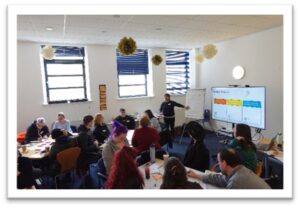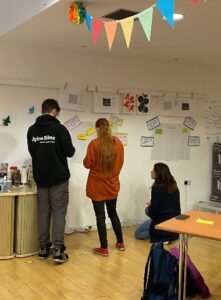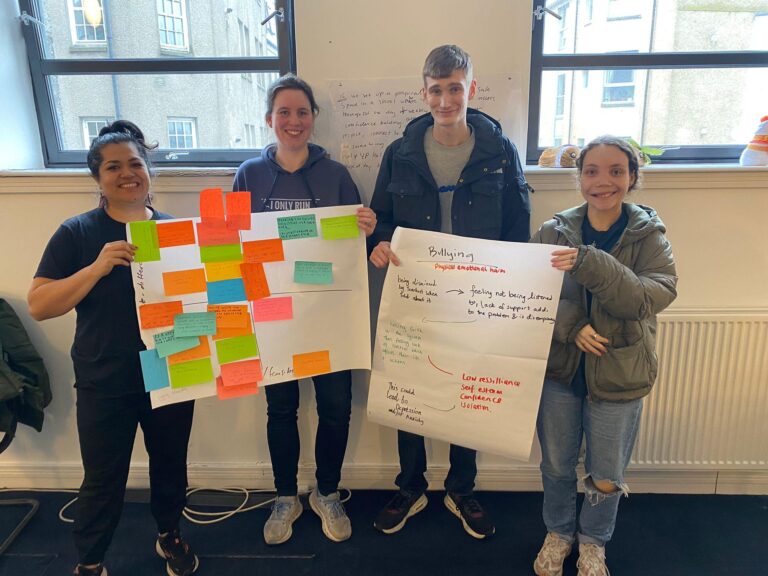Innovation Social
Innovation Social
What if there was a space for young people, concerned individuals and youth serving organisations to come together to solve complex social problems that affect children and young people?
Reboot is an early systems change initiative aimed at improving outcomes with young people of Aberdeen and Aberdeenshire. Since launching in 2019, the Reboot team has brought different agencies with common agendas together to improve, change, or adapt systems addressing systemic and structural issues deviating young people from reaching positive destinations. Housed within Aberdeen Foyer, a place-based charitable organisation also committed to improving outcomes with young people, Reboot continues to explore ways in which to address complex social problems guided by lived experience.

Young People’s (YP) mental wellbeing has declined over the last ten years in Scotland and has worsened as the result of the pandemic. The pandemic is one of many factors impacting young people’s mental health, often attacking from all-sides at once. In addition, stigma attached to mental health makes it harder for individuals to seek support.With a fragmented and overloaded system, there is an urgency to ‘rip up the playbook’ and try something new.
The Innovation Social is curating as a ‘Brave Space’ to develop creative and bespoke solutions to improve mental wellbeing with young people. The first one launched in May 2023. The innovation social brings youth serving organisations, other sector agencies with an interest in improving outcomes for YP together in a room with young people as well. Having young people sharing the space guarantees a youth-centred approach to address the complex social issues they are faving.
The Innovation Social (IS) has two aims:
1) Identify the enabling factors and principals that contribute to ensuring a brave space for young people and practitioners supporting co-production.
2) Co-produce micro solutions that show promise to improve mental wellbeing with young people.
The Reboot team designed a process using participatory and person-centred facilitation methods to steward small groups of young people and practitioners to develop promising micro solutions to test within a three-month period. Although the day was well attended, conversations were flowing, and initial ideas designed, many teams were not able to follow through with testing their solutions. However, there were a few that attempted to collaborate and continue to push your ideas forward. Despite a lack of follow through, critical learning has emerged.
“The last part of the event where we had to give feedback was very useful as it was in person and written down allowing us to see what may have needed improved or what worked well.”
Gemma – Young Participant

Reflection
.
Although it is easier to pack up our bags and call it a day, the Reboot team needed to practice what they preach – the importance of learning by doing. To uncover learning, a reflection session was held with participants of the innovation social and the Reboot Team three months later. We reflected on different pieces of the innovation social; the topic, how people were grouped, methods used, how well teams worked together etc. Not only did we ask what went well and what needed to change we asked how they could change. Some of the suggestions for iterations were very helpful. For instance, the young people in the groups suggested that we have a higher ratio of young people to practitioner. The participants also asked the day to be broken into two, giving participants time to digest the first day and come back the following day with more energy.
Learning
- Getting youth servicing practitioners to work collectively with young people is no easy task. Given competing priorities and limited capacity, many groups could not follow through with their proposed micro solutions (even though they wanted to). Moving forward, we will be making it explicit that those attending the next innovation social will have to carve out a bit of time to implement a lean experiment with young people.
- Securing commitment of youth serving practitioners with young people is also challenging because many struggled to understand the concept of a micro solution. Having been conditioned to design hefty programs from start to finish, asking them to scale way down proved difficult. In fact, it could explain why young people understood the concept of micro solution better than the practitioners. They haven’t had to navigate the world of bureaucracy often attached to the public funding and linear progressions when designing interventions.
- Adding to the challenge of understanding what it means to design a lean solution, holding the innovation social in just one day was not conducive to relationship building and understanding the concepts that were introduced.
- Although a lot of energy and thinking went into curating a space to level the playing field for young people and practitioners to work together, some young people still felt that they were not taken seriously. To address this, they suggested we increase the number of young people so that groups are mostly composed of young people. They also suggested to have a young person co-facilitating the innovation social.
Next Steps:
In February 2024, the next iteration of the Innovation Social or version 2.0 will be launched. This time, the innovation social is co-designed with participants from the first innovation social. Reboot will be looking for young people to co-facilitate the next one to improve intergenerational co-production. We will continue to find ways to improve mental wellbeing with young people. If you would like to participate in the next Innovation Social, please get in touch [email protected]







